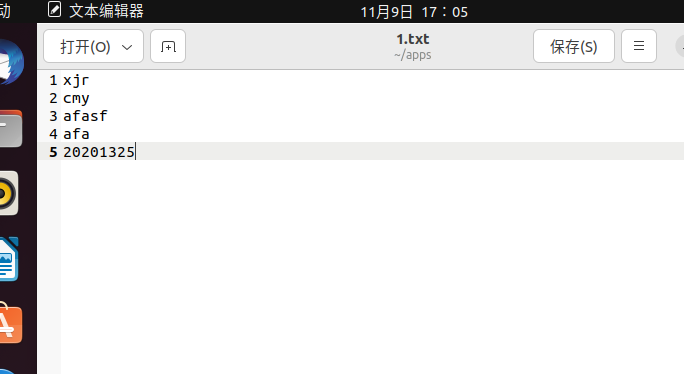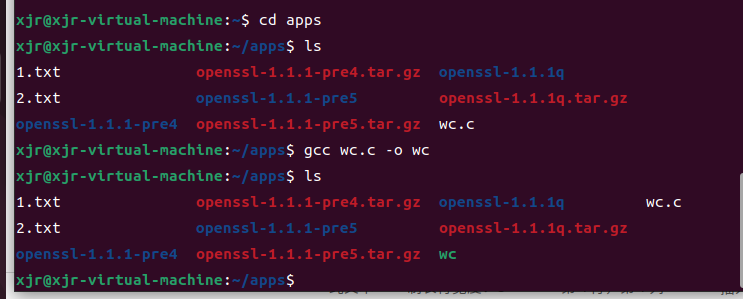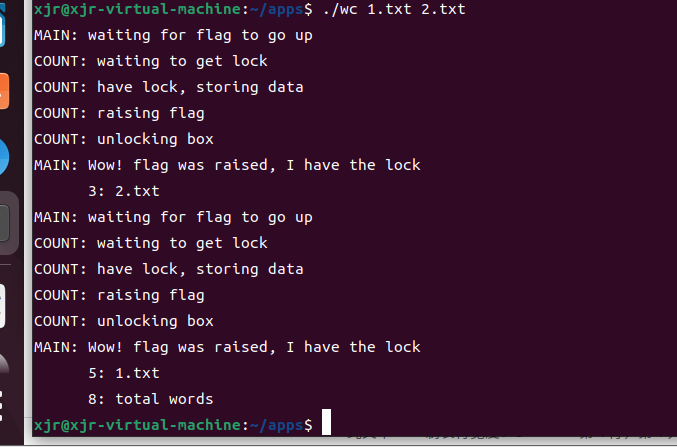thread互斥测试
任务详情
1.编译运行附件中的代码,并说明程序的功能
2.根据自己的理解,提交不少于3张图片
代码:
#include <stdio.h>
#include <stdlib.h>
#include <pthread.h>
#include <ctype.h>
struct arg_set {
char *fname;
int count;
};
struct arg_set *mailbox = NULL;
pthread_mutex_t lock = PTHREAD_MUTEX_INITIALIZER;
pthread_cond_t flag = PTHREAD_COND_INITIALIZER;
void *count_words(void *);
int main(int argc, char *argv[])
{
pthread_t t1, t2;
struct arg_set args1, args2;
int reports_in = 0;
int total_words = 0;
if ( argc != 3 ){
printf("usage: %s file1 file2\n", argv[0]);
exit(1);
}
args1.fname = argv[1];
args1.count = 0;
pthread_create(&t1, NULL, count_words, (void *) &args1);
args2.fname = argv[2];
args2.count = 0;
pthread_create(&t2, NULL, count_words, (void *) &args2);
pthread_mutex_lock(&lock);
while( reports_in < 2 ){
printf("MAIN: waiting for flag to go up\n");
pthread_cond_wait(&flag, &lock);
printf("MAIN: Wow! flag was raised, I have the lock\n");
printf("%7d: %s\n", mailbox->count, mailbox->fname);
total_words += mailbox->count;
if ( mailbox == &args1)
pthread_join(t1,NULL);
if ( mailbox == &args2)
pthread_join(t2,NULL);
mailbox = NULL;
pthread_cond_signal(&flag);
reports_in++;
}
pthread_mutex_unlock(&lock);
printf("%7d: total words\n", total_words);
}
void *count_words(void *a)
{
struct arg_set *args = a;
FILE *fp;
int c, prevc = '\0';
if ( (fp = fopen(args->fname, "r")) != NULL ){
while( ( c = getc(fp)) != EOF ){
if ( !isalnum(c) && isalnum(prevc) )
args->count++;
prevc = c;
}
fclose(fp);
} else
perror(args->fname);
printf("COUNT: waiting to get lock\n");
pthread_mutex_lock(&lock);
printf("COUNT: have lock, storing data\n");
if ( mailbox != NULL ){
printf("COUNT: oops..mailbox not empty. wait for signal\n");
pthread_cond_wait(&flag,&lock);
}
mailbox = args;
printf("COUNT: raising flag\n");
pthread_cond_signal(&flag);
printf("COUNT: unlocking box\n");
pthread_mutex_unlock(&lock);
return NULL;
}
此代码的功能是测试thread的互斥,并互斥地进行查看两个文件中字符串的数量,第一个1.txt文件先获得锁,第二个2.txt文件则需要等待,当第一个完成之后再进行第二个文件的统计操作,最后输出总结果。
1.txt文件内容:

2.txt文件内容

编译过程

运行结果

说明
互斥锁是一种信号量,常用来防止两个进程或线程在同一时刻访问相同的共享资源。可以保证以下三点:
1.原子性:把一个互斥量锁定为一个原子操作,这意味着操作系统(或pthread函数库)保证了如果一个线程锁定了一个互斥量,没有其他线程在同一时间可以成功锁定这个互斥量。
2.唯一性:如果一个线程锁定了一个互斥量,在它解除锁定之前,没有其他线程可以锁定这个互斥量。
3.非繁忙等待:如果一个线程已经锁定了一个互斥量,第二个线程又试图去锁定这个互斥量,则第二个线程将被挂起(不占用任何cpu资源),直到第一个线程解除对这个互斥量的锁定为止,第二个线程则被唤醒并继续执行,同时锁定这个互斥量。
从以上三点,我们看出可以用互斥量来保证对变量(关键的代码段)的排他性访问。


